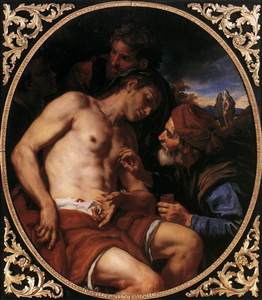The Face That Changes Us

MONDAY OF THE TWENTY–SEVENTH WEEK OF THE YEAR II
Galatians 1:6–12
Psalm 110:1–2, 7–8, 9 and 10c (R. 5b)
Luke 10:25–37
Today’s Gospel, the parable of the Good Samaritan, is familiar to us. It is, perhaps, too familiar. That may be the problem. We assume that we have grasped its message when, in fact, its message may not yet have grasped our hearts. The Fathers of the Church discerned a mystery in the story of the Good Samaritan: the mystery of the healing mercy of God revealed in Christ.
The Good Samaritan is none other than Christ Himself. In the days of His flesh, as He journeyed in this world, Christ came to where we were (cf, Lk 10:33). And when He saw all of us, sinners, stripped, and beaten, and left for dead in a ditch, He had compassion (cf. Lk 10:33). The human Heart of God was moved. God, looking upon us through the eyes of His Christ, suffered at the sight of our suffering.
It would be altogether too facile to reduce the message of today’s gospel to its ethical demands alone, to hear it exclusively in terms of a social imperative. Be good. Be sensitive. Be caring. Show mercy. It is, of course, all of that. Saint Faustina reminded of us the imperative of mercy in action last week. Our Lord said to Faustina: “I demand of you deeds of mercy, which are to arise out of love for me. You are to show mercy to your neighbours always and everywhere. You must not shrink from this or try to excuse or absolve yourself from it.” That being said, there is more to the parable of the Good Samaritan.
Most of us prefer to cast ourselves in the role of the Samaritan rather than to see ourselves in the one robbed, stripped, forsaken, and half-dead. The Samaritan is the hero. The Samaritan keeps the upper hand in the story. The Samaritan is splendid. Who among us does not, at least sometimes, want to be splendid?
Churches are full of splendid people and of people who want to be splendid. We needed the teaching of a twenty–four year old Doctor of the Church to see that holiness is not about being splendid at all. Saint Thérèse tells that it is, rather, about accepting that we have landed in the gutter, that we are in fact without resources, stripped, wounded, half-dead, and utterly incapable of changing any of that by ourselves. The God who bends over our souls with a face of indescribable tenderness, the God who touches our wounds with the strong and gentle hands of mercy, meets us not in the high places, not in Jerusalem, nor in Jericho, nor on the road of a splendid progress, but in the gutter of our absolute need of Him.
In the Samaritan of today’s gospel, the Fathers of the Church discern the face, the heart, the hands of Christ. Christ is near us in our poverty, near us in our nakedness, nearer to us when we are broken and brought very low than we when we are splendid and marching on. “A Samaritan, as he journeyed, came to where he was; and when he saw him, he had compassion” (Lk 10:33).
Christ comes to where we are and, seeing us, has compassion. Christ stops for each of us; He binds up our wounds, pouring oil and wine upon them, cleansing and disinfecting them, healing them with the medicine of his Spirit and of his Blood. Christ lifts us from where he finds us. He brings us to the inn of his Father’s healing hospitality where He cares for us, and pays all our expenses.
When the poor man opened his eyes to see who it was who was caring for him with such tenderness he beheld a human face. Christ is the human Face of God, the Face we behold when we open our eyes to see who it is who is caring for us. In the end, it is the experience of this Face that changes us. It is in the closeness of this Face to ours, with, as Blessed Elizabeth of the Trinity said, “his eyes in our eyes,” and with the warmth of his breath upon us, that we are resurrected to newness of life and sent back to the road whence we came to “go and do likewise” (Lk 10:37).
